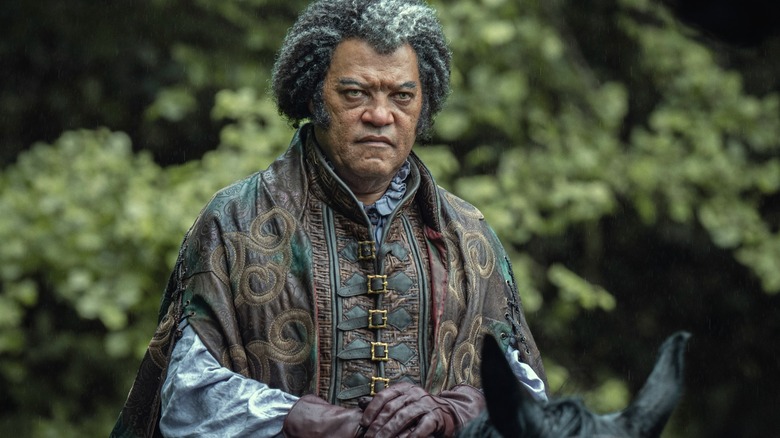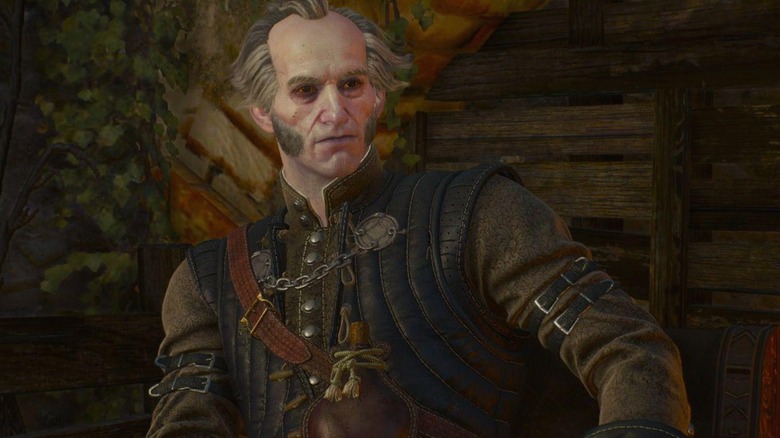Who Is Emiel Regis? Laurence Fishburne's Witcher Season 4 Character, Explained
This post contains spoilers for "The Witcher" season 4.
Geralt of Rivia (Liam Hemsworth) and his companions — Jaskier (Joey Batey), Milva (Meng'er Zhang), and some dwarves — stumble upon a wraith in season 4 of "The Witcher." The wraith, who is haunting a graveyard, is quickly put out of her misery, thanks to Geralt's agile swordsmanship. After Geralt smells aniseed nearby, an elderly gentleman reveals himself, kindly offering the group food and shelter back at his cottage. He introduces himself as Emiel Regis (Laurence Fishburne), barber-surgeon of Dillingen, assuring that he merely intends to patch up Geralt's wounds and offer everyone a place to rest. The crew's decision to rest proves to be prudent, as it boosts everyone's morale (thanks to an excellent batch of Regis' mandrake moonshine).
Andrzej Sapkowski's "The Witcher" novel series positions Regis as one of Geralt's closest allies, and the character receives a similar treatment in CD Projekt Red's "The Witcher 3: Wild Hunt." As hinted in the episode he's introduced in, Regis is a powerful higher vampire who doesn't need to directly feed on blood to survive. But Regis' importance to the story has more to do with his alliance with Geralt and co., as we see him accompany the group on their journey to Nilfgaard to rescue Ciri (Freya Allan). Later on, Regis is instrumental during the Fort Armeria storyline, in which he is able to track down the captured witcher (plus Jaskier) and free them with his abilities.
Fishburne's plays Regis as a shrewd and graceful ally, but his rendition is markedly different from the character we know in the books and games. As brilliant as Fishburne is as a performer, he feels woefully miscast in this particular role (the uninspired constuming certainly doesn't help). So, is there more to Regis than the series lets on?
Regis is particularly complex (and endearing) in The Witcher's Blood and Wine expansion
Sapkowski makes it easy for us to believe that an unwavering monster-slayer like Geralt chooses not to kill Regis even after learning about his vampirism. This is because Geralt meets Regis at a point where he's emotionally volatile due to Ciri's disappearance, and where the higher vampire's wise counsel proves crucial to the witcher's growth as a character. This is also the case in the Netflix adaptation; Geralt finds a dear friend in Regis, who helps him navigate his emotions.
As for "The Witcher 3," the game's timeline doesn't feature Regis as he's presumed dead in the books. That said, Regis makes a surprise comeback in the game's "Blood and Wine" DLC, which is a beautiful addition to the character's lore.
The DLC opens with Geralt vacationing in Touissant, where he intends to retire soon. But trouble brews once Regis arrives there in search of the vampire Dettlaff, who is on a vicious killing spree. After Geralt is hired to slay the beast, Regis intervenes, pleading with him not to do so. You see, Dettlaff was the one who had resurrected Regis after he was killed, and Regis wants to understand Dettlaff's motivations before making a rash judgment. What ensues is a thrilling cat-and-mouse game rife with clues, red herrings, and intricate choices, where Geralt needs to have faith in his old friend, the vampire he desperately wishes to protect.
"Blood and Wine" understands why Regis is such a beloved character. He breaks every stereotype associated with higher vampires, while willingly embracing noble and self-sacrificing tendencies. There's an edge to these convictions, which is wholly missing from Fishburne's version, who feels like just another one of Geralt's allies along the road.

